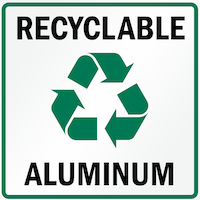
Aluminium enclosure based Li-Ion Power Backup Products
Share
Aluminium enclosures in the Electronics Industry: A Material of Choice
Aluminum is a versatile metal that is widely used in the electronics industry due to its many favorable properties. In this blog post, we will discuss some of the key advantages of using aluminum in electronic products and why chose to design and manufacture our next line of products using aluminium.
In the dynamic and ever-evolving realm of electronics, the selection of materials plays a pivotal role in determining the performance, durability, and overall success of electronic devices. Among the plethora of materials available, aluminium stands out as a frontrunner, offering a unique blend of properties that make it an indispensable choice for a wide range of electronic applications. For Lithium-Ion battery based power banks, strength and weight are two critical properties. Most power banks are made using Acrylonitrile Butadiene Styrene (ABS) that can break and are also not heat resistant.
Energy Intelligence products are made of Aluminium for exactly that balance of weight and strength.
Lightweight
One of the most important advantages of aluminum is its light weight. Aluminum is about one-third the weight of steel, making it ideal for use in portable electronic devices such as laptops, smartphones, and tablets. This can help to reduce the overall weight of the device and make it easier to carry around.

Strength
Despite its light weight, aluminum is a relatively strong metal. It has a high strength-to-weight ratio, which means that it can withstand a lot of force without breaking. This makes aluminum a good choice for use in electronic enclosures and other structural components.
Corrosion Resistance
Aluminum is naturally resistant to corrosion. This is because it forms a thin oxide layer on its surface. This oxide layer protects the metal from the elements and prevents it from rusting. This is important for electronic products that may be exposed to moisture or other corrosive substances.
Thermal Conductivity
Aluminum is an excellent conductor of heat. This makes it a good choice for use in enclosure of electrical devices that at times need to dessipate heat. Use of aluminium for heatsink is well known.
Malleability and Precision Engineering: Shaping the Future
Aluminium's malleability, or its ability to be easily shaped and molded, is another valuable asset in the electronics industry. This property allows for the creation of intricate and complex designs, enabling manufacturers to produce innovative and aesthetically pleasing electronic products. Aluminium's malleability also facilitates efficient manufacturing processes, contributing to cost-effectiveness and production speed.
Enclosures for our products are precision designed and cut using CO2 laser machine to micrometer level accuracy.
Recyclability: A Sustainable Choice
In today's environmentally conscious world, recyclability is a crucial consideration for material selection. Aluminium shines in this regard, as it is one of the most recyclable materials available. It can be melted down and remanufactured into new products, reducing the need for raw material extraction and minimizing environmental impact. This recyclability fosters a circular economy, promoting sustainability and resource conservation.
Aluminium is one of the most recycle-able and recycled metal in the world.

Aluminium, A Material of Versatility and Value
Aluminium's unique blend of properties, including its lightweight nature, strength, corrosion resistance, electrical conductivity, malleability, and recyclability, has cemented its position as a material of choice in the electronics industry. Its versatility and adaptability make it an indispensable component in the development of innovative and high-performance electronic devices, shaping the future of electronics and driving advancements in various fields.
